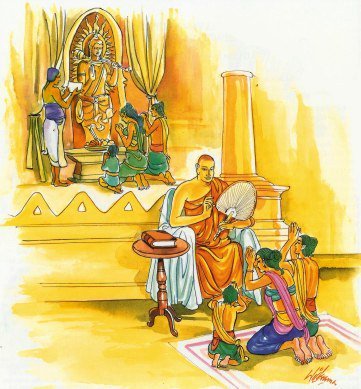Though a thousand verses be
composed of meaningless lines,
better the single line of verse
one hears, then comes to calm.
Explanation: A poem replete with thousands of verses is of no value if it has no useful meaning. One single stanza pregnant with wisdom is more valuable, if hearing it one is pacified.
The Story of Bahiyadaruciriya (Verse 101)
While residing at the Jetavana Monastery, the Buddha spoke this verse, with reference to Bahiyadaruciriya.
A group of merchants went out to sea in a boat; their boat was wrecked at sea and all, except one, died. The only survivor got hold of a plank and eventually came to land at the port of Supparaka. As he was naked, he tied a piece of bark to his body, got hold of a bowl, and sat in a place where people could see him. Passers-by gave him rice and gruel; some thought that he was a holy man and paid respects to him. Some brought clothes for him to wear but he refused, fearing that by wearing clothes, people would give less respect to him. Besides, because some said that he was an arahat, he mistakenly came to think that he really was one. Thus, because he was a man of wrong views who was wearing a piece of bark as his clothing, he came to be known as Bahiyadaruciriya. Mahabrahma came to him in the night and said to him, “Bahiya, you are not an arahat yet, and what is more, you do not have the qualities that make one an arahat” Bahiya looked up at Mahabrahma and said, “Yes, I must admit that I am not an arahat, as you have said. I now realize that I have done a great wrong. But is there anyone else in this world now who is an arahat (a perfected person)?” Mahabrahma then told him that there lived in Savatthi a Teacher, Gotama Buddha, an arahat, who was perfectly self-enlightened.
Bahiya found the Buddha going on an alms-round with other monks and respectfully followed him. He pleaded with the Buddha to teach him the Dhamma, but the Buddha replied that since they were on an alms-round it was not yet time for a religious discourse. And again, Bahiya pleaded, “Venerable, one cannot know the danger to your life or to my life, so please talk to me about the Dhamma.” The Buddha knew that Bahiya had made the journey of one hundred and twenty yojanas in one night, and also that he was overwhelmed with joy at seeing the Buddha. That was why the Buddha did not want to talk about the Dhamma immediately but wanted him to calm down to enable him to take in the Dhamma properly. Still, Bahiya persistently pleaded. So, while standing on the road, the Buddha said to Bahiya, “Bahiya, when you see an object, be conscious of just the visible object; when you hear a sound, be conscious of just the sound; when you smell or taste or touch something, be conscious of just the smell, the taste or the touch; and when you think of anything, be conscious of just the mind-object.”
After hearing the above discourse, Bahiya attained ara-hatship and he asked permission from the Buddha to join the Sangha. The Buddha told him to get the robes, the bowl and other requisites of a monk. On his way to get them, he was gored to death by a cow which was, in fact, a female evil spirit in the likeness of a cow. When the Buddha and the other monks came out after having had their meal, they found Bahiya lying dead on a rubbish heap. As instructed by the Buddha, the monks cremated the body of Bahiya and had his bones enshrined in a stupa. Back at the Jetavana Monastery, the Buddha told the monks that Bahiya had realized Nibbana. He also told them that as far as speed was concerned in attaining Magga Insight (abhinna) Bahiya was the fastest, the best (etadaggam). The monks were puzzled by the statement made by the Buddha and they asked him why and when Bahiya became an Arahat. To this, the Buddha replied, “Bahiya attained arahatship while he listened to my instructions given to him on the road when we were on the alms-round” The monks wondered how one could attain arahatship after listening to just a few sentences of the Dhamma. So, the Buddha told them that the number of words or the length of a speech did not matter if it was beneficial to someone.

